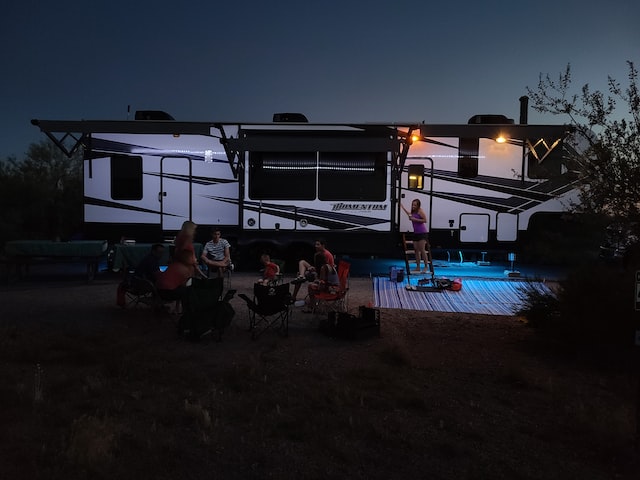
What is The financial cost of full-time RV life?
cannon
- 0
Full-time RV life isn’t something that everyone can do right away. It’s a lifestyle change and requires some planning, but it doesn’t have to be complicated. In fact, if you do your research and keep an eye on your budget (and cut back on certain things), it can actually save you money in the long run!
Welcome! First, let me give you a little background about myself and why I started this blog. I’ve been full-time RVing for about three years now, but before that, I was a city girl living in New York City. When my husband and I decided to go full-time RVing, we were completely clueless as to what it would cost us financially.
We realized that we needed to stay on top of our finances while living in an RV because the last thing we wanted was another bad credit score or bankruptcy due to unforeseen expenses.
Mortgages, insurance, and taxes.
If you own a home, selling it will be one of the biggest expenses when you start full-time RV life.
You’ll want to put any equity in your current home toward buying an RV so that you can live in it immediately. If you’re still paying off a mortgage on your house, this could add up to thousands of dollars. You may even think about paying off the loan early if possible so that there’s no balance remaining when you sell the house and start over with an RV mortgage instead.
Your insurance rates may drop because many insurance companies offer discounts for small vehicles like RVs—but check with yours before assuming anything! And, depending on where and how long you drive as well as what kind of vehicle(s) are involved (i.e., motorhome vs travel trailer), tax implications can vary wildly from state to state and even county-by-county within states themselves!
Everything else
Now that you’ve got a good idea of what it costs to own and maintain an RV, let’s talk about some of the other costs associated with full-time RV life.
These other expenses can be divided into three different categories:
- Stuff you will need to buy/pay for when you are not in your home state (this may include things like medical co-pays).
- Stuff that needs to be maintained on a regular basis (like oil changes, tire rotations, and such) but doesn’t require traveling across state lines (you’ll probably want to find a mechanic who can do this locally).
- Things that keep your vehicle running smoothly even though they don’t require leaving your home state: fuel filters, belts, and hoses are all examples of this type of thing!
RVing is an option for those ready to make major life changes.
If you plan to live in a recreational vehicle, you need to be ready for major life changes. You’ll need to sacrifice many comforts of home and the conveniences of urban living, including:
- Space: Full-time RVers typically live in 40-foot trailers that have less than 400 square feet of living space. If you’re lucky enough to have a bathroom inside your rig, it may only be half as big as your bathroom at home!
- Privacy: In addition to sacrificing space, full-time RVers also often sacrifice privacy. Although there are some RVs with private bedrooms (which can make them feel more like regular houses), most travel trailers don’t have any doors between rooms—or even walls separating sections within each room!
Some data from the Living On The Road blog.
The cost of an RV is one of the most common questions people ask when they are considering this lifestyle. While there isn’t a single answer for everyone, it is helpful to know how much RVs generally cost and what the different options are.
The average price tag on a new travel trailer or fifth wheel ranges from $15,000-$30,000 depending on features and size. For example, The general consensus among RVers seems to be that you get what you pay for when it comes to brand names like Coachmen or Forest River….
Some averages.
The average household income in America is $63,359. The median household income is $59,039.
The average RV owner makes more than the median household income, with an estimated $80,000 annual wage.
According to a survey from the National Association of RV Parks & Campgrounds (ARVC), 38% of RVs are owned by retirees, and another 15% fall into the next highest retirement bracket (55-64).
The financial cost of full-time RV living
So, how much does it cost? The financial cost of living full-time in an RV is the same as any other type of living arrangement. You need a place to live, food to eat, and clothes on your back. Your lifestyle will be different than others because you are not tied down by rent or mortgage payments, but you still have the same needs and expenses as everyone else.
If you want to know exactly what your expenses might look like as a full-time RVer and how they compare with those of other lifestyles (home ownership, apartment rental), then keep reading!
The cost of commuting to work.
If you are currently working outside of your RV, and have a job that is within commuting distance (i.e., less than six hours each way), then the cost of transportation to work will likely be the same—or possibly even less—than it was when you were living in a house or apartment.
You may be able to get away with driving a smaller car than you had before because your monthly loan payments will be lower and gas prices tend to be lower in rural areas than they are in cities. However, if your commute is longer than six hours per day, then it’s probably cheaper for you to move closer to where you work so that all those extra miles don’t add up over time and become too much expense on their own
The cost of meals out, at work, or bought while they were on the move (gas station, grocery store, etc.).
There are many expenses associated with eating out. There are also those who eat in, but have to drive somewhere to pick up their food or have it delivered to them. For example, if you work a job that does not provide lunch hours for your employees and you choose not to pack it yourself, then this will be an additional cost.
Similarly, if you go on the road and spend some time at gas stations or grocery stores along the way then there is no doubt that these purchases add up quickly!
How much does it cost to be on vacation or take time off (trip costs, hotel, and food costs, etc.)
Now that you have a good idea of what it will cost to live out of an RV full-time, let’s take a look at some other costs of living on the road.
- Trip costs (airfare, gas & food)
- Hotel and food costs while traveling
- Vacation time off work to travel
RV life can save you money or cost you money – it all depends on your lifestyle and how you choose to live.
Being an RV full-timer can save you a lot of money or cost you even more, depending on how much debt you have and what your housing situation is like.
For example: if you are living in an apartment or house that costs $1,000 per month and don’t own it outright, then it will be harder for you to save money since your rent payments eat up a large portion of your income. On the other hand, if both your mortgage and car payments are paid off, then most of your paycheck will go towards paying down debt and saving for retirement; plus an extra $1k-$2k left over each month that could potentially go towards enjoying life as an RV full-timer!
You feel a pull in your heart to live life on the road.
You feel a pull in your heart to live life on the road.
You have a dream of traveling and seeing new places. You imagine spending time with family and friends all over the country. You can’t swing quitting your job and living off savings, but you also don’t want to settle down just yet. Maybe you’ve had an idea for something new or maybe you just want to spend more time with your family. Whatever it is that drives you, it’s not going away anytime soon – so what do we do?
The answer is simple: take action! The first step is making sure that we’re able to pay for ourselves while traveling full-time – and fortunately, RV living doesn’t need to cost much!
You have dreams of traveling and seeing new places, but you can’t swing quitting your job and living off savings.
You have dreams of traveling and seeing new places, but you can’t swing quitting your job and living off savings. You have a plan: make enough money to pay off all your debt, buy an RV, and hit the road! But how much will it cost?
Before we get into the nitty-gritty details of what it costs to live on the road, let’s talk about a few things that may surprise you.
- Most people who decide to travel full-time aren’t going broke doing it – they’re actually saving money by not paying rent or mortgage payments! This is because RVs are fairly cheap compared with other housing options like apartments or houses (especially if you buy second-hand). The average price for an RV in the US is about $30k; this includes everything from tiny campers with wheels up through luxury motorhomes which cost upwards of $400k.
- It’s possible for full-time RVers who work part-time jobs from their home base instead of having a traditional office job that pays well but requires commuting every day (or more than one hour each way). However, there are additional expenses such as internet connection fees and cell phone service bills which might bring down overall average earnings figures for this type of person.
If you’re dreaming of hitting the road to travel full-time, the first question you might be asking is how much it costs.
The financial cost of full-time RV life? It depends!
The costs of living on the road can be broken down into three main categories: food, fuel, and other expenses. Then there are factors such as how much you spend on entertainment and hobbies, which often add up to more than you think. These expenses are both variable and dependent on your lifestyle choices (e.g., if you like to travel often). The good news is that many of these costs can be reduced by simply making smart decisions while traveling full-time in an RV.
First things first, set a realistic budget based on your current income and expenses.
One of the first things you’ll want to do is create a realistic budget. You can use one of many free budgeting apps, or set up your own spreadsheet using numbers from your past year’s tax returns and bank statements (or a combination of both). The 50/20/30 rule is a great way to get started: it divides spending into three categories: needs, wants, and savings. Needs are things like food and shelter; wants are items that bring you joy but aren’t necessary for living (e.g., entertainment such as Netflix or Amazon Prime); and savings should be money set aside for future expenses like insurance premiums or car maintenance costs. By allocating money in this way, you’ll have an easier time sticking with your budget while still enjoying life on the road!
How much does it cost to go full-time RV? It depends on how you decide to live.
The answer to this question depends on a few factors. Where you decide to live and how much you can save are important considerations, but the biggest factor might be your lifestyle and personal preferences. For example, if you want a bigger RV and can afford it, then that will obviously increase your costs. If you like eating out more than cooking at home, then that will add some extra dollars onto your monthly budget as well!
The bottom line is this: living full-time in an RV does not have to break the bank! It’s true that there are plenty of things that could cost more than expected—especially if unexpected repairs crop up or anything else goes wrong with the rig—but if you do some research beforehand on ways to save money while traveling full-time (there are lots of great resources online), then chances are good that going nomad won’t be too expensive for long term travel enthusiasts who’ve prepared well for their new lifestyle change by saving money ahead of time through scrimping on rent or other bills back home.
The good news is, there are plenty of ways to cut down on expenses while still enjoying full-time RV life.
The good news is, there are plenty of ways to cut down on expenses while still enjoying full-time RV life. Here’s how:
- A lot of your costs are fixed, so you can’t really reduce them. For example, insurance premiums will be the same no matter where you drive your RV. So when it comes to reducing costs for living in an RV full time, focus on variable expenses first. Variable costs include things like food and entertainment; these need to be re-evaluated from time to time depending on where you go and what’s available where you choose to live. For example: if there’s not a Whole Foods nearby or if they don’t sell organic produce at farmers’ markets near where you park your rig, then eating healthy becomes more challenging—and more expensive! On the other hand: if there are plenty of opportunities for hiking both close by AND free (which may include some local parks), then getting out into nature is something that doesn’t cost anything at all!
Post-RV life may not be as luxurious as life on the road, but it doesn’t have to mean a dramatic change in lifestyle.
Being off the road is a big change, and it may not be as luxurious as it was while you were traveling. You might find that your spending habits have changed, or you may have to find a new job. But don’t worry! You can still enjoy life on the road without sacrificing all of your time and money.
- Cut down on your spending:
- You will have to cut down on expenses such as rent, utilities, food, and other daily costs if you want to make ends meet without working full time (or any time). It’s important to remember that even though your income has decreased significantly when compared with pre-RV life, most of the things that cost money still do so now—it’s just that some of them are cheaper than they used to be (like gas) while others remain expensive (like groceries).
- Find work wherever you land:
- If possible try finding some part-time work in a field related to what brought about retirement from RVing in the first place; this way it won’t seem like such an interruption in lifestyle change or career path progression
What if I told you that budgeting for full-time RV living doesn’t have to be complicated?
You’ve made the decision to live in an RV full-time, but now you’re worried about how much it’s going to cost. I get it! It can be overwhelming at first. But there are just a few things you need to know before getting started:
What do I need?
Your first step is figuring out what type of RV best fits your needs and lifestyle. Are you looking for a smaller camper van or something more spacious? Do you have children who will need their own space? How many people will be living in the RV with you on a daily basis? These questions are important because they dictate which brands and models will fit your budget best. For example, if there are only two of us traveling together then we don’t need an oversized motorhome; instead, we’ll opt for something smaller like an Airstream Bambi Van (you can read more about our specific vehicle choice here). However, if we had kids with us then having extra room would make sense so that everyone has their own space when needed!
Conclusion
The truth is that you can live the RV life on any budget. If you’re dreaming of hitting the road to travel full-time, don’t let this stop you from pursuing your dreams! The first step is setting a realistic budget based on your current income and expenses. Once you’ve got that figured out, look for ways to cut down on expenses while still enjoying full-time RV life.
Related
Post Disclaimer
The information contained in this post is for general information purposes only. The information is provided by me and while we endeavor to keep the information up to date and correct, we make no representations or warranties of any kind, express or implied, about the completeness, accuracy, reliability, suitability or availability with respect to the website or the information, products, services, or related graphics contained on the post for any purpose.

